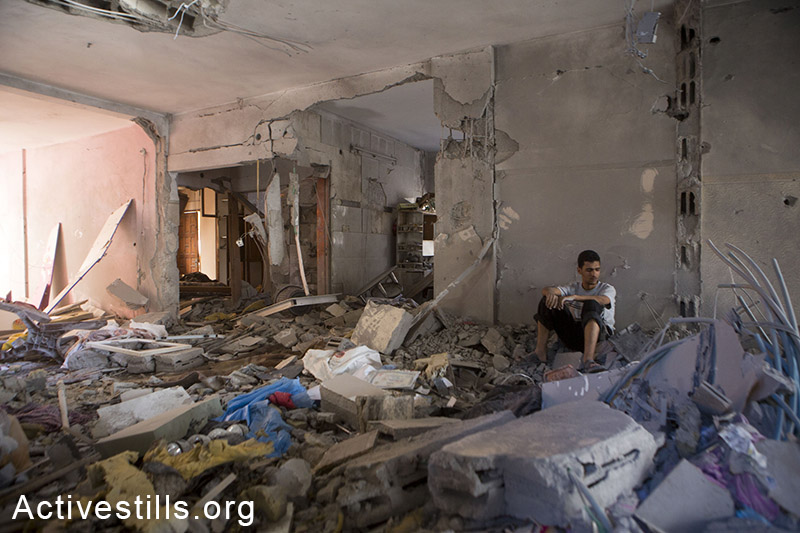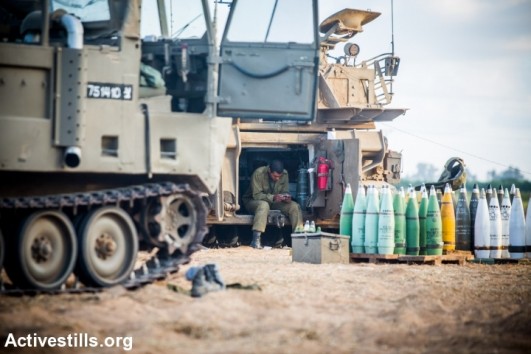Israel has no problem asserting an inviolable right to self-defense, while repeatedly denying the same right to Palestinians. The same state that decries Palestinian violence has no qualms meeting non-violent protests with fully armed aggression.
By Nadia Naser-Najjab
The ongoing conflict in Gaza has led international actors to reassert Israel’s right to self-defense. Any objection that these same actors have repeatedly failed to recognize, much less support, a Palestinian right to self-defense is routinely rejected upon the basis that it is not the international community’s role to take sides. Needless to say, in a context of open oppression and subjugation, this self-sanctifying neutrality is a form of ‘taking sides.’
In the context of the Israeli-Palestinian conflict, concepts such as balance have long assumed almost Orwellian overtones: in this context, balance has been equated with the imposition of a range of inequitable requirements on the Palestinians, without any similar requirements being placed upon their Israeli counterparts.

Palestinians are occupied and they resist like any other nation in the same circumstances. As Israel intensified its measures over the years, Palestinians intensified their resistance. Israel sliced up the land and separated Palestinians into different categories: good Palestinians and bad Palestinians. But for the Israelis the good are not good enough. We are all suffocated and strangled by the occupation, yet Gaza suffers the most. The situation affects all Palestinians and Israelis, but the Palestinians are affected on a much larger scale and physically, not only psychologically. Furthermore, we never include all the Palestinians who have suffered extensive trauma from constant Israeli aggression and attacks.
At the same time that international actors insist upon an impossible balance, official Israeli rhetoric is predicated upon a set of binary distinctions: it is as if Israel can only define itself in Manichean terms: civilized versus barbaric, sanctity of life versus culture of death. At all times there is a sustained refusal to conceive of Palestinians as equals, as if to even acknowledge the subject would somehow be a denigration of one’s own rightful status and prestige.
In similar terms, Israel has no problem asserting an inviolable right to self-defense while repeatedly denying the same right to Palestinians; or in celebrating its own “liberal democratic” character while instituting an occupation regime that is predicated upon the arbitrary and widespread use of both direct and indirect violence. The same state that decries Palestinian violence has no qualms meeting non-violent protests with fully armed aggression.
Read +972′s coverage of the latest round of violence in Gaza and Israel
As with historical colonialism, Israel’s self-righteousness is matched only by its hypocrisy. Whenever I hear Israeli spokesmen talk of a Palestinian culture of violence and hatred, I think back to the 1980s when my village routinely encountered curfews, home invasions and calculated, systematic acts of violence by Israeli troops. Local men were driven to the village schoolyard in the middle of the night to be humiliated and beaten. Birzeit University in the West Bank was closed several times by military order; I was not able to graduate on time. This punishment was consciously collective in character – there was, as there is now, no respect for fundamental human rights or any attempt to distinguish non-combatants from combatants.
It is therefore surprising to hear Israeli politicians now calling for Palestinians to disavow violence. This is just another example of the dual standards that have historically sustained colonial power: “our” violence is inherently moral, yet “their” violence is further confirmation of an inherent barbarity. The Oslo Accords did nothing to address this dual standard and, in fact, further institutionalized it.
Over the course of the 1990s Palestinians were subjected to an increasingly wide range of restrictions and prohibitions, all under the aegis of an illusionary “peace” process and in part due to the settler roads that carved up Palestinian land. Ironically, prior to the so-called peace process, it was possible for me to meet friends in Gaza and Jerusalem, and relatives in Haifa. Now we keep in touch via social media.
Travel within the West Bank is similarly difficult. Trips that previously took 5-7 minutes now routinely take 35 minutes. The short journey between Birzeit University and Ramallah has at times taken me several hours due temporary checkpoints set up along the road. There is no longer any room left for a contiguous Palestinian state.

There is also no sense of normality when everyday life is subject to the arbitrary decisions of the occupation’s administrators. The establishment of the “security” wall is further evidence of the extent to which Israeli security is predicated upon Palestinian insecurity; Israeli rights necessarily mean the denial of Palestinian rights.
During the First Intifada it was possible to conceive of a peace founded upon equal rights – the two-state solution had not yet been discredited among Palestinians and many Israeli peace and human rights groups actively asserted the rights of Palestinians. The Second Intifada made it more difficult for these voices to be heard, and Israel’s subsequent drift to the Right has marginalized them still further.
Even if these voices were to reassert themselves, Palestinians would have good reason to be suspicious. In the past, “peace” has served as a means by which existing imbalances are preserved and institutionalized. Even now, international interventions take Israel’s security as a non-negotiable precondition, without any mention of the fact that its current government increasingly appears to be the main threat to its own long-term security. In this sense, peace has become complicit in the ongoing abuse and denial of fundamental rights, and the subordination of justice to other imperatives.
Ultimately, there is the suspicion that any peace that is not founded upon mutual regard and the equal rights of both sides is not a peace worth pursuing or preserving.
Dr Nadia Naser-Najjab has a PhD in Middle East Studies and is an Associate Research Fellow at the European Center of Palestine Studies-Institute of Arab and Islamic Studies at the University of Exeter.
Related:
The abnormal reality of the occupation and its ‘escalations’
Propaganda wars: Searching for a narrative in Operation Protective Edge
COMIC: What if Mahmoud was named Jonah

